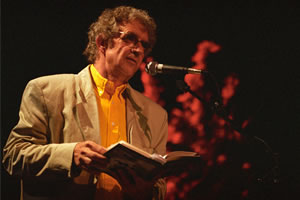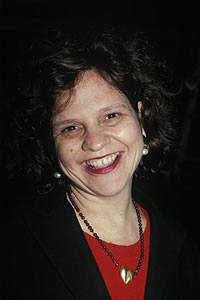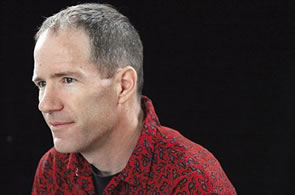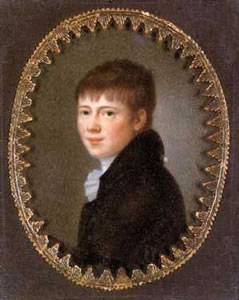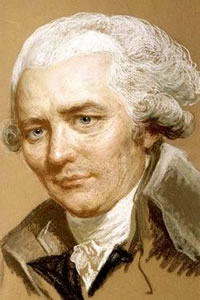De Nederlandse literatuurcriticus, essayist en letterkundige Kees Fens werd geboren in Amsterdam op 18 oktober 1929. Fens volgde zijn middelbareschoolopleiding aan het St. Ignatiuscollege in Amsterdam, waar hij in 1948 zijn A-diploma behaalde. Daarna volgde hij in de avonduren een studie Nederlands-MO. Tussen 1959 en 1982 werkte hij als leraar Nederlands, vanaf 1964 aan de Frederik Muller Academie in Amsterdam. In 1982 werd hij benoemd tot hoogleraar in de moderne Nederlandse letterkunde aan het instituut Nederlands van de Katholieke Universiteit Nijmegen. Na zijn emeritaat in 1994 volgde nog een benoeming tot bijzonder hoogleraar literaire kritiek aan diezelfde universiteit. In 2001 legde hij ook die functie neer.
Tegelijkertijd schreef Fens literaire kritieken, vanaf 1955 voor het weekblad De Linie, van 1960 tot 1968 voor het dagblad De Tijd en van 1968 tot 1978 voor de Volkskrant. Voor die laatste krant is hij tot en met 2008 blijven schrijven, meest over literaire onderwerpen, hoewel hij er ook een tijdlang een sport-column voor verzorgde. Kees Fens schreef voor de Tijd een wekelijkse column onder het pseudoniem A.L. Boom van 1976 tot het einde van het blad in 1989.
Samen met J.J. Oversteegen en H.U. Jessurun d’Oliveira richtte hij in 1962 het invloedrijke literair tijdschrift Merlyn op. Waardering voor zijn werk is niet uitgebleven. Literaire prijzen en een eredoctoraat aan de Universiteit van Amsterdam vielen hem ten deel. Op 14 juni 2009 werd de brug tussen de Hartenstraat en de Reestraat – schuin tegenover zijn laatste woonhuis aan de Amsterdamse Keizersgracht – omgedoopt tot de Kees Fensbrug. Zie ook mijn blog van 15 juni 2008.
Uit: Over Nescio’s ‘Dichtertje’
“Anders is het met het dichtertje, met Coba en Dora, de drie belangrijkste figuren uit Dichtertje. Zij laten zich door de lezer zonder schaamte bij de naam noemen doordat hier niet van binnenuit maar van buitenaf beschreven wordt, vanuit de hoogte zelfs, zou ik willen zeggen: de auteur heeft de touwtjes stevig in de hand. Op maar enkele plaatsen komt hij als ik-figuur het verhaal binnen en dan zeer zelfbewust als schrijver, de almachtige die zijn figuren verdomd goed door heeft: hij alleen weet wat omgaat in de personen van dit verhaal, die juist van elkaar niets weten. Zo toont hij zijn almacht en alwetenheid aan het einde van het vierde hoofdstuk: ‘Gelukkig, ’t dichtertje hoort niets, zijn gedicht zonder eind is weer in een stadium datti er stapel zot van wordt. Hij ziet op dat terras al die vrouwen zitten en er gaan er voorbij op straat. “O God,” denkt-i, “als er nu eens een wonder gebeurde, als nu eens ineens van al die vrouwen al de kleeren afvielen?”
Een dichtertje dat den waanzin nabij is denkt rare dingen. U en ik lezer denken nooit zoo iets. En mijn lezeressen… heilige onschuld, ik moet er niet aan denken.’ Bij het begin van hoofdstuk zes onderbreekt de auteur zijn verhaal zelfs met een korte uitweiding over de reacties van zijn vrouw op het tot nu toe vertelde. De passage eindigt als volgt: ‘De situatie is voor mij pijnlijk, mijn huiselijk geluk is ietwat gestoord, toch ga ik door.’ En dan begint met de volgende alinea een der wonderlijkste passages uit de novelle. ‘Daar wandelt de God van Nederland weer op ’t Damrak over ’t gloeiende asfalt.’ Maar die God van Nederland staat nu niet in relatie tot het door hem niet begrepen dichtertje, maar tot de ik-figuur, die die incarnatie van fatsoen en burgerdom in een volgende alinea naar de vuilnisbelt bidt. Wat doet die God van Nederland plotseling op het Damrak, waar hij al meer gesignaleerd werd? Van zijn vrouw zegt de ik-figuur, ‘dat ze de poëzie in dit verhaal niet begrijpt.’ En haar commentaar is fatsoenlijk en burgerlijk, typisch in de geest van de God van Nederland, die maar één norm heeft: Potgieter. Geen wonder dus, dat die God nu de wereld van de ik-figuur zelf binnenstapt. Nadat hij hem naar de vuilnisbelt gebeden heeft, vervolgt hij: ‘Nu kan mijn geest mijn verdomde zelf verlaten en recht naar boven gaan als blauwe rook in een stille zomeravond, als een verre koe klagelijk loeit.’ Dat zou een uitlating van het dichtertje zelf kunnen zijn. De ik-figuur vervolgt dan: ‘En nu is alles weg dat geweest is en ik ben Dora en in een nieuwe wereld, die dezelfde is als de oude, maar gezien van de voeten des Vaders, van waar ik ook neerzie op Dora, die ikzelf ben, een vrouw nu, een meisje, zoolang de genade duurt.’
Ik moet bekennen, tegen de laatst geciteerde alinea nog al lang te hebben aangekeken. Ik kan de passage niet anders zien dan als een omschrijving van een zelfbewust schrijverschap, dat vrij gemaakt is van alle belemmeringen in het voorgaande stuk genoemd, zó vrij dat het van boven op zijn schepselen neerziet, waarmee het zich ook kan vereenzelvigen ‘zoolang de genade duurt.’ Zeggen, dat Dora met de ik-figuur geheel te identificeren is, in de zin dat de ik-figuur eigen belevenissen in haar ervaringen weergeeft, durf ik niet. Daarvoor is, dunkt mij, te weinig bewijsmateriaal in het geciteerde fragment aanwezig. Bovendienlijkt mij de dubbele houding: zien van bovenaf en mogelijkheid tot vereenzelviging, dat wil gemeenplaatserig zeggen: de wereld zien vanuit de verhaal-figuur (waarmee de auteur zijn macht, want zijn alwetendheid demonstreert) kenmerkend voor de opzet van Dichtertje.”

Kees Fens (18 oktober 1929 – 14 juni 2008)
De Noorse dichter, vertaler en musicus Jan Erik Vold werd geboren op 18 oktober 1939 in Oslo. Zie ook mijn blog van 18 oktober 2008.
MIT DER NASE
gegen
das Moos. Mit der Nase
gegen den Spiegel. Mit
der Nase
gegen
den Rücken der
Geliebten. Sodass er den Gewehrlauf
im
Nacken
nicht
spürt.
UNSERE
Hände
waren feucht. Der Lippenstift hieß
Sans.
Egal. Ein Mann
kletterte eine Neonleiter hinauf
bis zuoberst
aufs Hausdach. Unsere Herzen
schmolzen. Im Kino
dunkel. Schmolzen
im Kinodunkel. Das Dunkel im Kino
Central.
Vertaald door Walter Baumgartner
Fan
A fan has no trade union.
A fan is left without an interest organization
A fan belongs to a powerless collective.
Who shall fight for the cause of the fans?
Engelse vertaling door Lars E. Finsen
Jan Erik Vold (Oslo, 18 oktober 1939)
De Afrikaans – Amerikaanse schrijfster Terry McMillan werd geboren op 18 oktober 1951 in Port Huron, Michigan. Zie ook mijn blog van 18 oktober 2008.
Uit: A Day Late and A Dollar Short
“Can’t nobody tell me nothing I don’t already know. At least not when it comes to my kids. They all grown, but in a whole lotta ways they still act like children. I know I get on their nerves-but they get on mine, too – and they always accusing me of meddling in their business, but, hell, I’m their mother. It’s my job to meddle.
What I really do is worry. About all four of ‘em. Out loud. If I didn’t love ‘em, I wouldn’t care two cents about what they did or be the least bit concerned about what happens to ‘em. But I do. Most of the time they can’t see what they doing, so I just tell ‘em what I see. They don’t listen to me half the time no way, but as their mother, I’ve always felt that if I don’t point out the things they doing that seem to be causing ‘em problems and pain, who will? Which is exactly how I ended up in this damn hospital: worrying about kids.
I don’t even want to think about Cecil right now, because it might just bring on another attack. He’s a bad habit I’ve had for thirty-eight years, which would make him my husband. Between him and these kids, I’m worn out. It’s a miracle I can breathe at all. I had ‘em so fast they felt more like a litter, except each one turned out to be a different animal. Paris is a female lion who don’t roar loud enough. Lewis is a horse who don’t pull his own weight. Charlotte is definitely a bull, and Janelle would have to be a sheep – a lamb is closer to it – ‘cause she always being led out to some pasture and don’t know how she got there.
As a mother, you have high hopes for your kids. Big dreams. You want the best for them. Want ‘em to get the rewards from life that you didn’t get for one reason or another. You want them to be smarter than you. Make better choices. Wiser moves. You don’t want them to be foolish or act like fools. Which is why I could strangle Lewis my damnself. He is one big ball of confusion. Always has had an excuse for everything, and in thirty-six years, he ain’t changed a lick.
In 1974, he did not steal them air conditioners from the Lucky Lady Motel that the police just happened to find stacked up in the back seat of our LeSabre way out there in East L.A. Lewis said his buddy told him they belonged to his uncle. And why shouldn’t he believe him?”
Terry McMillan (Port Huron, 18 oktober 1951)
De Amerikaanse schrijfster Wendy Wasserstein werd geboren op 18 oktober 1950 in New York. Zie ook mijn blog van 18 oktober 2008.
Uit: Elements of Style
“Frankie completely forgot Samantha ever said she would call. But on a Thursday night while she was dressing for an exercise class the phone rang. Frankie decided to let the machine pick it up and concentrate instead on getting to the gym. If it was her office or something important, it would have been on her pager or the other line.
“Hi, this is Samantha Acton. Great to see you at the ballet.” Frankie stared at her phone machine as if it were malfunctioning. “Will you come to dinner next Thursday? I mentioned to my husband, Charlie, that I saw you and he said he’d love for us to get together.”
Frankie uncharacteristically lunged for the phone with her exercise tights still around her knees.
“Oh, hi, Samantha.”
“Oh, you’re there. Screening, are you?”
“I win a lot of free trips to Orlando. And then there’s my father’s wife, Helen.”
“Oh, I remember her. She wore leopard while all our mothers were in tweeds.”
“I’m amazed you remember her!” Frankie was truly impressed.
“She was sexy, and you know, there wasn’t a whole lot of that back then. So will you come?”
“Sure. I think so.”
“Great. We live at East Sixty-sixth and Fifth, number 4. Say eight o’clock. Can’t wait. Charlie will be so pleased.”
Frankie took her tights off her legs and sat down on the couch. She knew there was no way she would still be exercising tonight. Somewhere, she felt enough sense of accomplishment that after thirty years she was finally invited to the cool girls’ table.
“I’m going upstairs to Acton.” Frankie stopped at the white-gloved Fifth Avenue doorman.
“Elevator to your right.”
As Frankie entered the formal lobby she wondered why Samantha didn’t live somewhere hipper or less imposing. Then again, Christmas tree earrings in a room full of painters and filmmakers is a yawn. But in a room full of investment bankers and inherited wealth it’s practically performance art.
The elevator door opened to a spare gallery of beige walls and Rothkos. A butler opened the door and a waiter appeared with a tray of caipirinhas.
“Can I take your coat?” the butler asked.
“Oh sure.”
Frankie gave him her coat and, for some reason she didn’t understand, her purse.
“Would you like to take your shoes off?”
Frankie actually didn’t want to. They were suede boots which took her forever to get on. But she was too good a guest not to do what she was told. She sat down in the vestibule to remove them.”
Wendy Wasserstein (18 oktober 1950 – 30 januari 2006)
De Amerikaanse dichteres en schrijfster Ntozake Shange werd geboren als Paulette Williams op 18 oktober 1948 in Trenton, New Jersey. Zie ook mijn blog van 18 oktober 2008.
fire & rain
one thing i dont need
is any more apologies
i got sorry greetin me at my front door
you can keep yrs
i dont know what to do wit em
they dont open doors
or bring the sun back
they dont make me happy
or get a mornin paper
didnt nobody stop usin my tears to wash cars
cuz a sorry
i am simply tired
of collectin
i didnt know
i was so important toyou’
i’m gonna haveta throw some away
i cant get to the clothes in my closet
for alla sorries
i’m gonna tack a sign to my door
leave a message by the phone
‘if you called
to say yr sorry
call somebody
else
i dont use em anymore’
i let sorry/didnt meanta/& how cd i know abt that
take a walk down a dark & musty street in brooklyn
i’m gonna do exactly what i want to
& i wont be sorry for none of it
letta sorry soothe yr soul/i’m gonna soothe mine
you were always inconsistent
doin somethin & then bein sorry
beatin my heart to death
talkin bout you sorry
well
i will not call
i’m not goin to be nice
i will raise my voice
& scream & holler
& break things & race the engine
& tell all yr secrets bout yrself to yr face
& i will list in detail everyone of my wonderful lovers
& their ways
i will play oliver lake
loud
& i wont be sorry for none of it
i loved you on purpose
i was open on purpose
i still crave vulnerability & close talk
& i’m not even sorry bout you bein sorry
you can carry all the guilt & grime ya wanna
just dont give it to me
i cant use another sorry
next time
you should admit
you’re mean/low-down/triflin/& no count straight out
steada bein sorry alla the time
enjoy bein yrself
Ntozake Shange (Trenton, 18 oktober 1948)
De Duitse schrijver Heinrich von Kleist werd geboren op 18 oktober 1777 in Frankfurt an der Oder. Zie ook mijn blog van 18 oktober 2006 en ook mijn blog van 18 oktober 2007 en ook mijn blog van 18 oktober 2008.
Uit: Das Erdbeben in Chili
“In St. Jago, der Hauptstadt des Königreichs Chili, stand gerade in dem Augenblicke der großen Erderschütterung vom Jahre 1647, bei welcher viele tausend Menschen ihren Untergang fanden, ein junger, auf ein Verbrechen angeklagter Spanier, namens Jeronimo Rugera, an einem Pfeiler des Gefängnisses, in welches man ihn eingesperrt hatte, und wollte sich erhenken. Don Henrico Asteron, einer der reichsten Edelleute der Stadt, hatte ihn ungefähr ein Jahr zuvor aus seinem Hause, wo er als Lehrer angestellt war, entfernt, weil er sich mit Donna Josephe, seiner einzigen Tochter, in einem zärtlichen Einverständnis befunden hatte. Eine geheime Bestellung, die dem alten Don, nachdem er die Tochter nachdrücklich gewarnt hatte, durch die hämische Aufmerksamkeit seines stolzen Sohnes verraten worden war, entrüstete ihn dergestalt, daß er sie in dem Karmeliterkloster unsrer lieben Frauen vom Berge daselbst unterbrachte.
Durch einen glücklichen Zufall hatte Jeronimo hier die Verbindung von neuem anzuknüpfen gewußt, und in einer verschwiegenen Nacht den Klostergarten zum Schauplatze seines vollen Glückes gemacht. Es war am Fronleichnamsfeste, und die feierliche Prozession der Nonnen, welchen die Novizen folgten, nahm eben ihren Anfang, als die unglückliche Josephe, bei dem Anklange der Glocken, in Mutterwehen auf den Stufen der Kathedrale niedersank.
Dieser Vorfall machte außerordentliches Aufsehn; man brachte die junge Sünderin, ohne Rücksicht auf ihren Zustand, sogleich in ein Gefängnis, und kaum war sie aus den Wochen erstanden, als ihr schon, auf Befehl des Erzbischofs, der geschärfteste Prozeß gemacht ward. Man sprach in der Stadt mit einer so großen Erbitterung von diesem Skandal, und die Zungen fielen so scharf über das ganze Kloster her, in welchem er sich zugetragen hatte, daß weder die Fürbitte der Familie Asteron, noch auch der Wunsch der Äbtissin selbst, welche das junge Mädchen wegen ihres sonst untadelhaften Betragens liebgewonnen hatte, die Strenge, mit welcher das klösterliche Gesetz sie bedrohte, mildern konnte.“
Heinrich von Kleist (18 oktober 1777 – 21 november 1811)
De Amerikaanse schrijver Rick Moody werd geboren op 18 oktober 1961 in New York. Zie ook mijn blog van 18 oktober 2008.
Uit: Demonology
“They came in twos and threes, dressed in the fashionable Disney costumes of the year, Lion King, Pocahontas, Beauty and the Beast, or in the costumes of televised superheroes, Protean, shape–shifting, thus arrayed, in twos and threes, complaining it was too hot with the mask on, Hey, I’m really hot!, lugging those orange plastic buckets, bartering, haggling with one another, Gimme your Smarties, please as their parents tarried behind, grownups following after, grownups bantering about the schools, or about movies, about local sports, about their marriages, about the difficulties of long marriages, kids sprinting up the next driveway, kids decked out as demons or superheroes or dinosaurs or as advertisements for our multinational entertainment providers, beating back the restless souls of the dead, in search of sweets…”
Rick Moody (New York, 18 oktober 1961)
De Belgische schrijver Raymond Brulez werd geboren te Blankenberge op 18 oktober 1895. Zie ook mijn blog van 18 oktober 2006 en ook mijn blog van 18 oktober 2008.
Uit: Kleine Essais al buitelend (Nieuwe onzakelijkheid)
“Het station van Brugge gelijkt op een kathedraal: gotische zuilen, spitsbogige ramen; tot zekere onmisbare plaatsen toe werden naar biechtstoelen gecopiëerd… Dit ergerde steeds mijn vriend Huib Hoste, den ijverigen voorvechter eener achitectuur die naar de nuchtere schikking van onversierde massa’s streeft. Langen tijd heb ik zijn ergernis gedeeld, maar nu vraag ik me af: of het wel wenschelijk is dat de dingen er ook uitzien zooals ze in wezenlijkheid zijn? Waarom zou een zwemkom de gedaante niet mogen aannemen van een schouwburgzaal, of een academisch auditorium deze van cirkus? ‘Wij willen een eerlijke architectuur, meneer!…’ roepen de modernisten. Zij staan sterk: ze profiteeren van de crisis van deugdzaamheid die we thans doormaken. Poëten en politiekommissarissen worden gedemaskeerd… Maar ‘eerlijkheid’ is een zedelijk begrip. Ethica heeft met kunst niets te maken. Een muur, hij zij nu opgetrokken in neue Sachlichkeit of neo-Gothiek, is op zichzelf geen moreel of immoreel ding. (Hij kan het weliswaar worden naar gelang hij behangen wordt met aankondigingen van radiotreinen naar Beauraing of frivole voorstellingen van den Carnaval van Nice.) Puritanisme is geen aesthetisch criterium. Ik herhaal: ‘Laat de dingen schijnen wat ze niet zijn!…’
Geen strenge redeneering, maar wel een persoonlijke beleving bekeerde mij tot dit irrationalisme. Zekeren dag had ik in de wachtzaal van bovenvermeld gesmade station, een beslissend onderhoud, met een persoon die voor mij zoo duurbaar als obsedeerend was… Schroom alsook andere overwegingen beletten mij hier duidelijker te zijn… Kortom, het was zoo wat de dramatische situatie van Titus en Berenice: ‘Invitus invitam remesit!…’ Ge snapt het niet?… Sla er eens uw Winkler Prins op na of de roze bladzijden van den kleinen Larousse… Met dit bescheiden correctief: dat held en heldin slechts tot de mindere klassen van burgerij en proletariaat behoorden… Welnu, hoe harmonisch paste de duisternis der wachtzaal bij onze gelatenheid, de Rembrandtbelichting der hooge boogvensters bij haar ontroerde gestalte!… Ik ben overtuigd dat: hadde zich ons afscheid voltrokken in de brutale helderheid en ontnuchterde atmosfeer van een modern gebouw, ik er niet die fluweelig zachte herinnering zou van behouden hebben die mij zoo duurbaar blijft…”

Raymond Brulez (18 oktober 1895 – 17 augustus 1972)
De Franse schrijver Pierre Ambroise François Choderlos de Laclos werd geboren in Amiens op 18 oktober 1741. Zie voor onderstaande schrijvers ook mijn blog van 18 oktober 2006 en ook mijn blog van 18 oktober 2008.
Uit: Les liasons dangereuses
« C’est peu pour mon inhumaine de ne pas répondre à mes lettres, de refuser de les recevoir ; elle veut me priver de sa vue, elle exige que je m’éloigne. Ce qui vous surprendra davantage, c’est que je me soumette à tant de rigueur. Vous allez me blâmer. Cependant je n’ai pas cru devoir perdre l’occasion de me laisser donner un ordre : persuadé, d’une part, que qui commande s’engage ; et de l’autre, que l’autorité illusoire que nous avons l’air de laisser prendre aux femmes est un des pièges qu’elles évitent le plus difficilement. De plus, l’adresse que celle-ci a su mettre à éviter de se trouver seule avec moi me plaçait dans une situation dangereuse, dontj’ai cru devoir sortir à quelque prix que ce fût : car étant sans cesse avec elle, sans pouvoir l’occuper de mon amour, il y avait lieu de craindre qu’elle ne s’accoutumât enfin à me voir sans trouble ; disposition dont vous savez assez combien il est difficile de revenir.“

François Choderlos de Laclos (18 oktober 1741 – 5 september 1803)
















